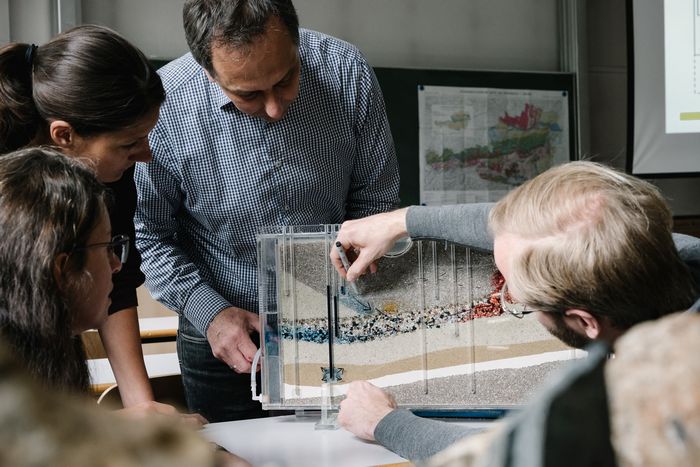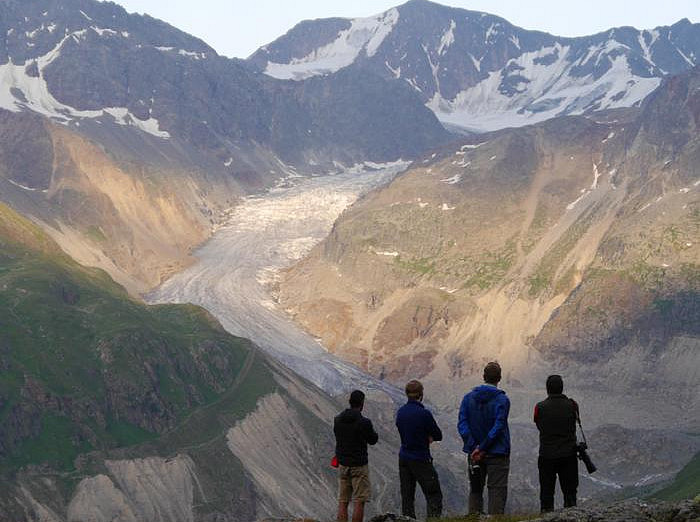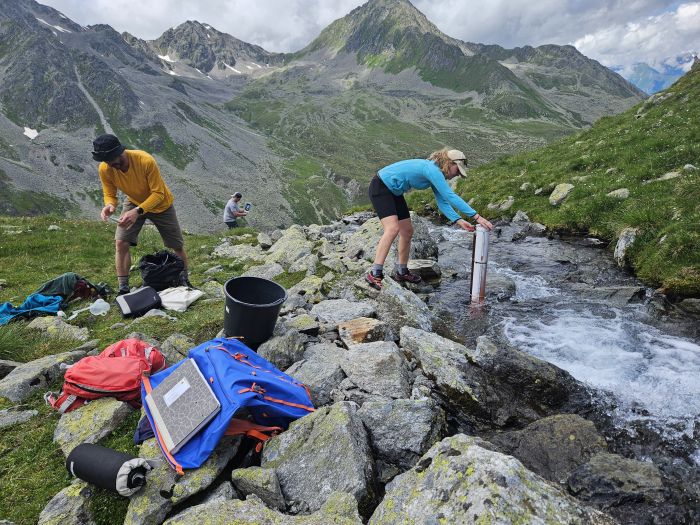Groundwater in a changing climate
Groundwater, which is invisibly stored underground, is the most important resource for our water supply. As part of the water cycle, it is also important for ecosystems such as wetlands and streams. In contrast to surface water, groundwater generally reacts more slowly to changes in the water cycle. Recognizing and evaluating the effects of climate change and direct human intervention on the quantity and quality of groundwater and distinguishing them from natural influences is therefore a key task of current hydrogeological research. Indirect effects, such as climate-related changes in vegetation or land use, pose a particular challenge. In order to identify influences on groundwater, we analyze field and laboratory data using computer-based methods. In doing so, we combine hydrogeological methods with approaches from other disciplines, for example from agricultural and biological research.


Alpine hydrogeology
Alpine hydrogeology deals with the hydrosphere and, in particular, the groundwater in mountainous regions. Alpine aquifers can be bound to fractured and/or karstified solid rock, but also to porous unconsolidated rock masses. The focus is on the characterization of alpine catchment areas and their aquifers as well as the quantification of groundwater recharge from infiltrating rain and snow and ice melt. Knowledge of the storage properties of aquifers and drainage dynamics is a prerequisite for the sustainable use and protection of Alpine groundwater resources. This is becoming more and more relevant as humans are increasingly encroaching on the natural Alpine region and thus endangering this vital resource.
"Qualitative and quantitative impact of climate change on alpine spring waters and their microbial biodiversity - an eco-hydrogeological approach" - ECOSPRING (OEAW-ESS, 2023-2025)
Gerfried Winkler (Project leader)
Project team: Thomas Wagner (Senior Scientist), Matevz Vremec (PostDoc), Magdalena Seelig (PhD student), Martin Masten (PhD student), Jakob Halder (Project assistant)
The effects of climate change on the hydrology of alpine regions are causing increasing pressure on alpine freshwater resources and biodiversity hotspots. Spring waters are important resources for water supply and alpine ecosystems. In ECOSPRING, the influence of climate change on alpine spring discharges is being investigated at over 90 springs of the Austrian Hydrographic Service, which are distributed across the entire Austrian Alpine region. In parallel, a comprehensive data set of the microbial biodiversity of alpine spring waters in Austria is being compiled. Microbial community patterns of the springs will be recorded and their applicability as environmental tracers with regard to fluctuating water quality and different catchment characteristics will be investigated. Based on hydrogeological and ecological indicators and indices, an integrative eco-hydrogeological classification will be developed.

Selected publications
Seelig, M., Seelig, S., Vremec, M., Hausleber, M., Obwegs, M., Wagner, T., Brielmann, H., Stromberger, B., Eybl, J., Winkler, G. (2024): Time series and trend analysis of the spring monitoring sites of the Austrian Hydrographic Service. Report - Federal Ministry of Agriculture, Forestry, Regions and Water Management, Vienna, p. 124. https://info.bml.gv.at/service/publikationen/wasser/trendanalyse-quellmessstellen.html
Seelig., M., Seelig, S., Vremec, M., Wagner, T., Brielmann, H., Eybl, J., Winkler, G. (2024): Quantitative Classification of Spring Discharge Patterns: A Cluster Analysis Approach. Hydrological Processes: an international journal. 38,12. 2024. e15326. doi:10.1002/hyp.15326
"Rock glaciers as groundwater storages in alpine catchments and their impact on downstream river systems with regard to climate change" RG-AlpCatch (DaFNE 101561; 2020-2024)
Gerfried Winkler (Project leader)
Project team: Simon Seelig (PostDoc), Thomas Wagner (Senior Scientist), Matevz Vremec (PostDoc), Jakob Halder (Project Assistant)
Rock glaciers are periglacial landforms and represent important groundwater reservoirs in (high) alpine regions. Due to their storage effect, their runoff supplies delayed quantities of water to underlying mountain streams. In five Alpine regions, the influence of rock glaciers on the runoff behaviour of underlying river systems is quantitatively recorded for 14 hydrological catchment areas with an area of between < 1 km² and up to 200 km². Climate scenarios are used for all test areas in order to investigate the extent to which the drainage dynamics of rock glaciers and the river systems connected to them downstream will change.

Selected publications
Seelig, S., Wagner, T., Krainer, K., Avian, M., Olefs, M., Haslinger, K., and Winkler, G. (2023): The role of thermokarst evolution in debris flow initiation (Hüttekar Rock Glacier, Austrian Alps), Nat. Hazards Earth Syst. Sci., 23, 2547-2568, https://doi.org/10.5194/nhess-23-2547-2023.
Erharter, G., T. Wagner, G. Winkler, T. Marcher (2022): Machine learning - An approach for consistent rock glacier mapping and inventorying - Example of Austria. Applied Computing and Geosciences 16, 100093. https://doi.org/10.1016/j.acags.2022.100093
Wagner, T., Kainz, S., Helfricht, K., Fischer, A., Avian, M., Krainer, K., Winkler, G. (2021). Assessment of liquid and solid water storage in rock glaciers versusglacier ice in the Austrian Alps. Science of the Total Environment, 800, 1-14, DOI:10.1016/j.scitotenv.2021.149593
Wagner, T., Kainz, S., Krainer, K., & Winkler, G. (2021). Storage-discharge characteristics of an active rock glacier catchment in the Innere Ölgrube, Austrian Alps. Hydrological Processes, 35(5), doi.org/10.1002/hyp.14210
Wagner, T., Brodazc, A., Krainer, K., Winkler, G. (2020): Active rock glaciers as shallow groundwater reservoirs, Austrian Alps. Groundwater. 25/3, 215-230. https://doi. org/10.1007/s00767-020-00455-x
Wagner, T., Kainz, S., Wedenig, M., Pleschberger, R., Krainer, K., Kellerer-Pirklbauer, A., Ribis, M., Hergarten, S, Winkler, g.(2019). Water management aspects of rock glaciers in crystalline areas of the Eastern Alps - storage behaviour, runoff dynamics and hydrochemistry with a focus on heavy metal loads (RGHeavyMetal) - Final report. Final report, Vienna, p. 158 https://info.bml.gv.at/themen/wasser/gewaesserbewirtschaftung/forschungsprojekte/RG-HeavyMetal.html
Seelig, S., Seelig, M., Krainer, K., & Winkler, G. (2025). Mechanisms of solute transport in ice‐supersaturated debris: 2. Rock glacier hydrology in alpine glacialperiglacial systems. Water Resources Research, 61, e2024WR037236. https://doi.org/10.1029/2024WR037236
Seelig, M., Seelig, S., Krainer, K., & Winkler, G. (2025). Hydraulics of channelized flow in ice‐supersaturated debris: 1. Rock glacier hydrology in alpine glacial‐periglacial systems. Water Resources Research, 61, e2024WR037235. https://doi.org/10.1029/ 2024WR037235
FORSITE II "Development of the ecological basis for dynamic forest typification in Styria, Upper Austria, Lower Austria and Burgenland"
FORSITE I + II - WP 2 Geology and substrate classification
Gerfried Winkler (Project leader)
Project team: Jennifer Brandstätter (PostDoc), Thomas Wagner (Senior Scientist), Esther Scheiblhofer (PhD student), Marlene Löberbauer (PhD student), Michael Gostencnik (project assistant), Marco Führer (project assistant), Adrian Reitenbach (project assistant), Elias Müller (project assistant), Johannes Rechberger (project assistant, MSc student)
Climate change represents the greatest challenge for sustainable forestry in Central Europe and therefore also for us in Austria. With up to 4° higher average annual temperatures, the forest will change drastically. For this reason, a comprehensive research project (FORSITE I) was started in Styria and subsequently extended to the provinces of Upper Austria, Lower Austria and Burgenland to develop a practical tool that offers concrete recommendations for each forest site for a site-adapted tree species selection under the aspect of climate change. In this context, our working group is concerned with recording the basics of the water and nutrient balance of the parent rock and the overlying substrate as a link to the forest soil.

Selected publications
Office of the Styrian Provincial Government (2023): Dynamische Waldtypisierung - Methodische Grundlagen und Beschreibung der Waldstandortseinheiten, Band 1, Amt der Steiermärkischen Landesregierung, ABT10 Land- und Forstwirtschaft, Landesforstdirektion Graz, p. 384.
Office of the Styrian Provincial Government (2023): Dynamische Waldtypisierung Steiermark - Anpassungsoptionen an den Klimawandel und Beschreibung der Waldgruppen, Band 2, Amt der Steiermärkischen Landesregierung, ABT10 Land- und Forstwirtschaft, Landesforstdirektion Graz, p. 448.
https://www.agrar.steiermark.at/cms/ziel/151504582/DE/